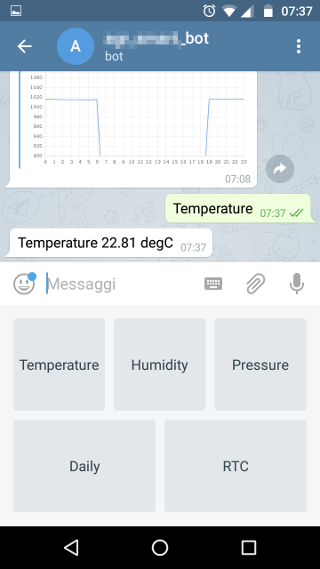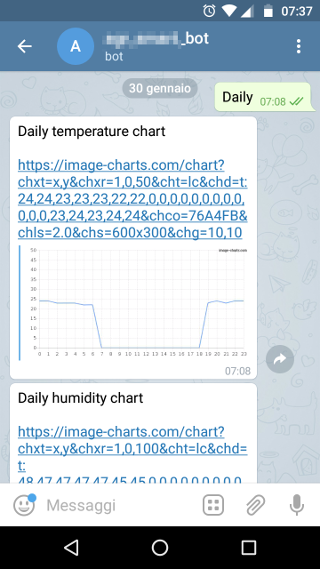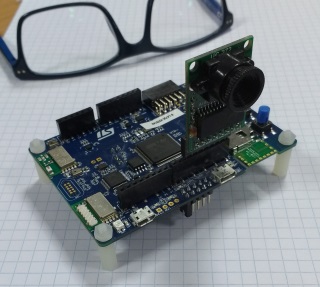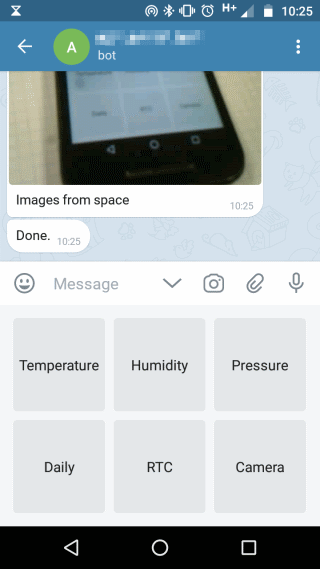A Telegram BOT for this awesome all-in-one board.
Dependencies: BSP_B-L475E-IOT01 mbed es_wifi jsmn
Telegram Bot for DISCO_L475VG_IOT01
This application embeds aTelegram chatbot into the DISCO_L475VG_IOT01 board.
The Bot answers to the users queries about:
- Real time environmental data taken from the on board sensors.
- Environmental data history of the latest 24 hours stored on board.
- Camera images taken from the Arducam-mini-2mp (optional).
This software uses:
- A modified version of the wifi library provided by ST in order to enable the TCP-SSL connection.
- An open source json parser jsmn (https://github.com/zserge/jsmn).
- A web service (http://now.http.org) to initialize the RTC.
- A web service (https://image-charts.com) to publish temperature,humidity and pressure charts.
- A modified version of the Arducam driver (https://os.mbed.com/users/dflet/)
Compilation
Import in your compiler and modify the following defines:
- WIFI_SSID
- WIFI_PASSWORD
- TELEGRAM_BOT_APIKEY
Please follow the Telegram bots documentation (https://core.telegram.org/bots) to better understand how the Telegram API works and how to create your bot.
In order to support the Arducam-Mini-2MP set WITH_ARDUCAM_2640 #define to 1.
Screenshots




Security
The Inventek wifi module creates the ssl connection but does not authenticate the server's certificate ( AT cmd P9=0 ).
For more details http://www.inventeksys.com/IWIN/programming-certificates-tcp-ssltls/
Diff: ArduCAM2640.h
- Revision:
- 8:89fe332bc412
--- /dev/null Thu Jan 01 00:00:00 1970 +0000
+++ b/ArduCAM2640.h Thu Feb 15 14:31:15 2018 +0000
@@ -0,0 +1,424 @@
+/*
+ ArduCAM.h - Arduino library support for CMOS Image Sensor
+ Copyright (C)2011-2015 ArduCAM.com. All right reserved
+
+ Basic functionality of this library are based on the demo-code provided by
+ ArduCAM.com. You can find the latest version of the library at
+ http://www.ArduCAM.com
+
+ Now supported controllers:
+ - OV7670
+ - MT9D111
+ - OV7675
+ - OV2640
+ - OV3640
+ - OV5642
+ - OV7660
+ - OV7725
+ - MT9M112
+ - MT9V111
+ - OV5640
+ - MT9M001
+
+ We will add support for many other sensors in next release.
+
+ Supported MCU platform
+ - Theoretically support all Arduino families
+ - Arduino UNO R3 (Tested)
+ - Arduino MEGA2560 R3 (Tested)
+ - Arduino Leonardo R3 (Tested)
+ - Arduino Nano (Tested)
+ - Arduino DUE (Tested)
+ - Arduino Yun (Tested)
+ - Raspberry Pi (Tested)
+
+
+ If you make any modifications or improvements to the code, I would appreciate
+ that you share the code with me so that I might include it in the next release.
+ I can be contacted through http://www.ArduCAM.com
+
+ This library is free software; you can redistribute it and/or
+ modify it under the terms of the GNU Lesser General Public
+ License as published by the Free Software Foundation; either
+ version 2.1 of the License, or (at your option) any later version.
+
+ This library is distributed in the hope that it will be useful,
+ but WITHOUT ANY WARRANTY; without even the implied warranty of
+ MERCHANTABILITY or FITNESS FOR A PARTICULAR PURPOSE. See the GNU
+ Lesser General Public License for more details.
+
+ You should have received a copy of the GNU Lesser General Public
+ License along with this library; if not, write to the Free Software
+ Foundation, Inc., 51 Franklin St, Fifth Floor, Boston, MA 02110-1301 USA
+*/
+
+/*------------------------------------
+ Revision History:
+ 2012/09/20 V1.0.0 by Lee first release
+ 2012/10/23 V1.0.1 by Lee Resolved some timing issue for the Read/Write Register
+ 2012/11/29 V1.1.0 by Lee Add support for MT9D111 sensor
+ 2012/12/13 V1.2.0 by Lee Add support for OV7675 sensor
+ 2012/12/28 V1.3.0 by Lee Add support for OV2640,OV3640,OV5642 sensors
+ 2013/02/26 V2.0.0 by Lee New Rev.B shield hardware, add support for FIFO control
+ and support Mega1280/2560 boards
+ 2013/05/28 V2.1.0 by Lee Add support all drawing functions derived from UTFT library
+ 2013/08/24 V3.0.0 by Lee Support ArudCAM shield Rev.C hardware, features SPI interface and low power mode.
+ Support almost all series of Arduino boards including DUE.
+ 2014/03/09 V3.1.0 by Lee Add the more impressive example sketches.
+ Optimise the OV5642 settings, improve image quality.
+ Add live preview before JPEG capture.
+ Add play back photos one by one after BMP capture.
+ 2014/05/01 V3.1.1 by Lee Minor changes to add support Arduino IDE for linux distributions.
+ 2014/09/30 V3.2.0 by Lee Improvement on OV5642 camera dirver.
+ 2014/10/06 V3.3.0 by Lee Add OV7660,OV7725 camera support.
+ 2015/02/27 V3.4.0 by Lee Add the support for Arduino Yun board, update the latest UTFT library for ArduCAM.
+ 2015/06/09 V3.4.1 by Lee Minor changes and add some comments
+ 2015/06/19 V3.4.2 by Lee Add support for MT9M112 camera.
+ 2015/06/20 V3.4.3 by Lee Add support for MT9V111 camera.
+ 2015/06/22 V3.4.4 by Lee Add support for OV5640 camera.
+ 2015/06/22 V3.4.5 by Lee Add support for MT9M001 camera.
+--------------------------------------*/
+
+/*
+Parts of this software is related to https://os.mbed.com/users/dflet/ work.
+*/
+
+
+#pragma once
+
+#include <mbed.h>
+#include "arducam_regs.h"
+
+/****************************************************/
+/* Sensor related definition */
+/****************************************************/
+/****************************************************/
+/* ArduChip related definition */
+/****************************************************/
+#define RWBIT 0x80 //READ AND WRITE BIT IS BIT[7]
+
+#define ARDUCHIP_TEST1 0x00 //TEST register
+#define ARDUCHIP_TEST2 0x01 //TEST register
+
+#define ARDUCHIP_FRAMES 0x01 //Bit[2:0]Number of frames to be captured
+
+#define ARDUCHIP_MODE 0x02 //Mode register
+#define MCU2LCD_MODE 0x00
+#define CAM2LCD_MODE 0x01
+#define LCD2MCU_MODE 0x02
+
+#define ARDUCHIP_TIM 0x03 //Timming control
+#define HREF_LEVEL_MASK 0x01 //0 = High active , 1 = Low active
+#define VSYNC_LEVEL_MASK 0x02 //0 = High active , 1 = Low active
+#define LCD_BKEN_MASK 0x04 //0 = Enable, 1 = Disable
+#define DELAY_MASK 0x08 //0 = no delay, 1 = delay one clock
+#define MODE_MASK 0x10 //0 = LCD mode, 1 = FIFO mode
+#define FIFO_PWRDN_MASK 0x20 //0 = Normal operation, 1 = FIFO power down
+#define LOW_POWER_MODE 0x40 //0 = Normal mode, 1 = Low power mode
+
+#define ARDUCHIP_FIFO 0x04 //FIFO and I2C control
+#define FIFO_CLEAR_MASK 0x01
+#define FIFO_START_MASK 0x02
+#define FIFO_RDPTR_RST_MASK 0x10
+#define FIFO_WRPTR_RST_MASK 0x20
+
+#define ARDUCHIP_GPIO 0x06 //GPIO Write Register
+#define GPIO_RESET_MASK 0x01 //0 = default state, 1 = Sensor reset IO value
+#define GPIO_PWDN_MASK 0x02 //0 = Sensor power down IO value, 1 = Sensor power enable IO value
+
+#define BURST_FIFO_READ 0x3C //Burst FIFO read operation
+#define SINGLE_FIFO_READ 0x3D //Single FIFO read operation
+
+#define ARDUCHIP_REV 0x40 //ArduCHIP revision
+#define VER_LOW_MASK 0x3F
+#define VER_HIGH_MASK 0xC0
+
+#define ARDUCHIP_TRIG 0x41 //Trigger source
+#define VSYNC_MASK 0x01
+#define SHUTTER_MASK 0x02
+#define CAP_DONE_MASK 0x08
+
+#define FIFO_SIZE1 0x42 //Camera write FIFO size[7:0] for burst to read
+#define FIFO_SIZE2 0x43 //Camera write FIFO size[15:8]
+#define FIFO_SIZE3 0x44 //Camera write FIFO size[18:16]
+
+#define OV2640_CHIPID_HIGH 0x0A
+#define OV2640_CHIPID_LOW 0x0B
+#define OV2640_CHIPID_HIGH_VALUE 0x26
+#define OV2640_CHIPID_LOW_VALUE 0x42
+
+/****************************************************/
+
+
+#define OV_RESOLUTION_VGA 1
+#define OV_RESOLUTION_QVGA 2
+#define OV_RESOLUTION_CIF 3
+#define OV_RESOLUTION_QQVGA 4
+
+#define OV2640_I2C_ADDR_W 0x0060
+#define OV2640_I2C_ADDR_R 0x0061
+
+class ArduCAM2640
+{
+public:
+
+ // ctor dtor
+ ArduCAM2640(){};
+ ~ArduCAM2640(){};
+
+ // setup
+ bool Setup(int resolution,int jpeg_quality,DigitalOut *cam_cs, SPI *cam_spi, I2C *cam_i2c)
+ {
+ uint8_t vid = 0;
+ uint8_t pid = 0;
+ const struct sensor_reg8 *pivot;
+
+ _cam_cs = cam_cs;
+ _cam_spi = cam_spi;
+ _cam_i2c = cam_i2c;
+
+ _cam_spi->format(8,0);
+ _cam_spi->frequency(8000000);
+ _cam_i2c->frequency(100000);
+ *_cam_cs = 1;
+
+ /* check spi i2c */
+ wrSensorReg8_8(0xFF,0x01);
+ rdSensorReg8_8(OV2640_CHIPID_HIGH,&vid);
+ rdSensorReg8_8(OV2640_CHIPID_LOW,&pid);
+ if ((vid != OV2640_CHIPID_HIGH_VALUE) || (pid != OV2640_CHIPID_LOW_VALUE))
+ {
+ printf("Can't find OV2640 module! vid = 0x%x pid = 0x%x\r\n", vid, pid);
+ return false;
+ }
+
+ /* setup resolution and jpeg quality */
+ wrSensorReg8_8(0xFF,0x01);
+ wrSensorReg8_8(0x12,0x80);
+ wait_ms(200);
+
+ pivot = &OV2640_JPEG_INIT[0];
+ while(1)
+ {
+ if(pivot->reg == 0xff && pivot->val == 0xff) break;
+ // quality register
+ if(pivot->reg == 0x44)
+ {
+ wrSensorReg8_8(pivot->reg,(uint8_t)100-jpeg_quality);
+ }
+ else
+ wrSensorReg8_8(pivot->reg,pivot->val);
+ pivot++;
+ }
+
+ pivot = &OV2640_YUV422[0];
+ while(1)
+ {
+ if(pivot->reg == 0xff && pivot->val == 0xff) break;
+ wrSensorReg8_8(pivot->reg,pivot->val);
+ pivot++;
+ }
+
+ pivot = &OV2640_JPEG[0];
+ while(1)
+ {
+ if(pivot->reg == 0xff && pivot->val == 0xff) break;
+ wrSensorReg8_8(pivot->reg,pivot->val);
+ pivot++;
+ }
+
+ wrSensorReg8_8(0xFF,0x01);
+ wrSensorReg8_8(0x15,0x00);
+
+ switch(resolution)
+ {
+ case OV_RESOLUTION_VGA:
+ pivot = &OV2640_640x480_JPEG[0];
+ break;
+ case OV_RESOLUTION_QVGA:
+ pivot = &OV2640_320x240_JPEG[0];
+ break;
+ case OV_RESOLUTION_QQVGA:
+ pivot = &OV2640_160x120_JPEG[0];
+ break;
+ case OV_RESOLUTION_CIF:
+ pivot = &OV2640_352x288_JPEG[0];
+ break;
+ default:
+ printf("Wrong resolution\r\n");
+ return false;
+ };
+
+ while(1)
+ {
+ if(pivot->reg == 0xff && pivot->val == 0xff) break;
+ wrSensorReg8_8(pivot->reg,pivot->val);
+ pivot++;
+ }
+
+ wait_ms(2000);
+
+ return true;
+ };
+
+ uint32_t CaptureImage(uint8_t *image_buffer, uint32_t image_buffer_size,uint32_t *jpeg_start_index)
+ {
+ uint32_t fifolen = 0;
+ uint32_t jpeg_start,jpeg_end;
+
+ flush_fifo();
+ start_capture();
+ while (!(get_bit(ARDUCHIP_TRIG, CAP_DONE_MASK)))
+ {
+ wait_ms(30);
+ }
+
+ fifolen = read_fifo_length() + 2;
+ if(fifolen>image_buffer_size)
+ {
+ printf("Arducam::CaptureImage fifo_len %d exceeds image_buffer_size %d\r\n",fifolen,image_buffer_size);
+ return 0;
+ }
+ printf("fifo len %d\r\n",fifolen);
+
+ image_buffer[0]=BURST_FIFO_READ;
+ *_cam_cs = 0;
+ _cam_spi->write((char*)image_buffer,fifolen,(char*)image_buffer,fifolen);
+ *_cam_cs = 1;
+
+ jpeg_start = image_buffer_size;
+ jpeg_end = 0;
+ for(int i=0;i<fifolen-1;i++)
+ {
+ if(image_buffer[i] == 0xFF)
+ {
+ if(image_buffer[i+1] == 0xD8 && jpeg_start == image_buffer_size)
+ {
+ jpeg_start = i;
+ }
+ else if(image_buffer[i+1] == 0xD9 && jpeg_end == 0)
+ {
+ jpeg_end = i+1;
+ break;
+ }
+ }
+ }
+
+ if( jpeg_start != image_buffer_size && jpeg_end != 0 )
+ {
+ *jpeg_start_index = jpeg_start;
+ return (jpeg_end - jpeg_start + 1);
+ }
+
+ return 0;
+ };
+
+private:
+ DigitalOut *_cam_cs;
+ SPI *_cam_spi;
+ I2C *_cam_i2c;
+
+ //Low level SPI write operation
+ int bus_write(int address, int value)
+ {
+ // take the SS pin low to select the chip:
+ *_cam_cs = 0;
+ // send in the address and value via SPI:
+ _cam_spi->write(address);
+ _cam_spi->write(value);
+ // take the SS pin high to de-select the chip:
+ *_cam_cs = 1;
+
+ return 0;
+ };
+
+ //Low level SPI read operation
+ uint8_t bus_read(int address)
+ {
+ uint8_t value = 0;
+ // take the SS pin low to select the chip:
+ *_cam_cs = 0;
+ // send in the address and value via SPI:
+ // printf("addr = 0x%x\r\n",address);
+ _cam_spi->write(address);
+ value = _cam_spi->write(0x00);
+ // take the SS pin high to de-select the chip:
+ *_cam_cs = 1;
+ return value;
+ };
+
+ //Write ArduChip internal registers
+ void write_reg(uint8_t addr, uint8_t data)
+ {
+ bus_write(addr | 0x80, data);
+ };
+
+ //Read ArduChip internal registers
+ uint8_t read_reg(uint8_t addr)
+ {
+ uint8_t data;
+ data = bus_read(addr);
+ return data;
+ };
+
+ //Reset the FIFO pointer to ZERO
+ void flush_fifo(void)
+ {
+ write_reg(ARDUCHIP_FIFO, FIFO_CLEAR_MASK);
+ };
+
+ //Send capture command
+ void start_capture(void)
+ {
+ write_reg(ARDUCHIP_FIFO, FIFO_START_MASK);
+ };
+
+ //Clear FIFO Complete flag
+ void clear_fifo_flag(void)
+ {
+ write_reg(ARDUCHIP_FIFO, FIFO_CLEAR_MASK);
+ };
+
+
+ //Read Write FIFO length
+ //Support ArduCAM Mini only
+ uint32_t read_fifo_length(void)
+ {
+ uint32_t len1,len2,len3=0;
+ uint32_t length=0;
+ len1 = read_reg(FIFO_SIZE1);
+ len2 = read_reg(FIFO_SIZE2);
+ len3 = read_reg(FIFO_SIZE3) & 0x07;
+ length = ((len3 << 16) | (len2 << 8) | len1);// & 0x07ffff;
+ return length;
+ };
+
+ //I2C Write 8bit address, 8bit data
+ uint8_t wrSensorReg8_8(int regID, int regDat)
+ {
+ uint8_t buff[2];
+ buff[0] = regID;
+ buff[1] = regDat;
+ _cam_i2c->write(OV2640_I2C_ADDR_W,(char*)buff,2);
+ return(1);
+ };
+
+ //I2C Read 8bit address, 8bit data
+ uint8_t rdSensorReg8_8(uint8_t regID, uint8_t* regDat)
+ {
+ _cam_i2c->write(OV2640_I2C_ADDR_W,(char*)®ID,1);
+ _cam_i2c->read(OV2640_I2C_ADDR_R,(char*)regDat,1);
+ return(1);
+ };
+
+ //Get corresponding bit status
+ uint8_t get_bit(uint8_t addr, uint8_t bit)
+ {
+ uint8_t temp;
+ temp = read_reg(addr);
+ temp = temp & bit;
+ return temp;
+ };
+
+};
+